-
lent
easter is early this year, so Ash Wednesday will scuttle quickly behind Valentine’s Day, arriving just three days later. When Easter arrives there will very likely still be snow on the ground in most places (the places I frequent) when we do some edition of an egg hunt. Late Easters, like the one we’ll have in 2022, with a chance of tree blossoms and visible grass, are my favorite.
There will be an abundance of ashes this year. The pre-blessed, pre-packaged, distantly-picked-up kind, the homemade kind from a smudge of ash on the inside of a glass or leaf burned in a dish, its bits smushed with olive oil. And the kind sitting in homes across the world, held in memory or in waiting for a chance to be scattered, from someone who was very much alive last Easter.
Instead of a gently bold touch of another pressing them against your forehead, there will just be your hand, or the hand of one in your household, to smush them on.
There won’t be people walking the street in the costumes of plague doctors but maybe there should be. There won’t be weeping and people rending their clothing in public grief but maybe there should be. The sun won’t disappear for 24hrs but it would feel appropriate if it did.
The dust to dust, the careless razor edge between death and life, the elemental grief of Ash Wednesday will come easy to us this year.
Thinking of the opening lines of Amanda Gorman’s recitation at the inauguration
When day comes we ask ourselves,where can we find light in this never-ending shade?The loss we carry,a sea we must wadeAnd after pinching ashes, maybe we will take on the voluntarily limitations of Lent with something like joy? Anything we accept will stand next to the limitations we’ve already accepted, the things we’ve given up for so much longer than 40 days: smiling frank handshakes with a new friend, visible smiles altogether, sticky bar drinks at night in the corner, potlucks with baked beans.
Anything we accept for Lent will be our choice to be our challenge. Ideally it’s a collective choice, one you make with another person or group of people, to experience together.
Reading through this pamphlet published by the Diocese in Toronto, my imagination was captured by their thoughtful list of suggested fasts. Week 7, an ignorance fast: Only creation can teach us how to live in the the face of creational lament and decline. This week we are fasting from ignorance: ignorance about the injustice that our lives are built on, and ignorance about the creation that surrounds us. They quote Job:
But ask the animals, and they will teach you; the birds of the air, and they will tell you;
ask the plants of the earth, and they will teach you; and the fish of the sea will declare to you.
Job 12.7-8Week 6, electricity fast: During this week, try to eliminate as much electricity from your life as possible. Light only the area in a room that you need for your activities, and only the room that you are in. Try a week with no movies, Facebook, Instagram, Twitter, television, or Youtube cat videos. This week culminates in Earth Hour on Saturday evening: turn off all electricity from 8:30-9:30pm.
I’m not sure what fast I’ll take, on but I do know it feels best to consider them in advance, and anticipate them. I invite you to click the link to the pamphlet and consider some of their suggestions.
A bit more Amanda Gorman to close
When day comes we step out of the shade,
aflame and unafraid
The new dawn blooms as we free it
For there is always light,
if only we’re brave enough to see it
If only we’re brave enough to be it -
a quiet, working-mom christmas book on my mind
Our Thanksgiving was a lonely one and this time is terrible and I can’t wait, my children can’t wait, until we’re back to not having overflowing hospitals and exhausted nurses. I’m following the vaccine news a bit and I feel optimistic about April (my birthday month!).
And I’m including a photo of our graham cracker houses from last year but Joe built these, I did not. I made the royal icing, which was really fun to make with dangerous egg whites, but I did not cut graham crackers precisely, with an exacto knife. Just so you know.




The Jesus Storybook Bible by Sally Lloyd Jones was given to me when I was pregnant with our first daughter. I have read it aloud to all of the girls through the years, but perhaps more importantly, I’ve played the audiobook for on repeat over the years. The audiobook is wonderful. The cds are often included in the purchase of this illustrated Bible (look for “with CDs” in the listing). The storytelling approach and enthusiasm in this retelling is the best.
-
Article of the year

Of all the articles I read this year, I’m still reflecting on one from July written about Gwyneth Paltrow. The writer, Taffy Brodesser-Akner, was cleverly both infatuated with G.P. and entirely aware of the aura that GP projects and the success that perhaps naturally follows it. There was a slightest touch of snark as she examined the hype of everything goop and the millions in profits involved therein, yet it was sisterly and affectionate and comfortable to read—like a fashion profile.
She wasn’t going to have more kids. That she also knew. Her business, her age, which is 45 — not impossible, but still. She’d wanted a third. She told me that after she asked how many I had, and I told her I had two children as well, and it was wonderful, but I was sad I didn’t have a third.
She told me I should rethink it while I’m still young enough. “All I’m saying is it’s not nothing,” she said. “I really wanted another one.” I nodded solemnly. (Later, I cried.)
I don’t read the goop newsletter, though it is exactly the type of thing I would imagine myself reading because I do like lists and recommendations. But a little over a year ago when goop began marketing vitamin combo packages with names like high school genes and why am I so effing tired? it was hard to look away from the brilliance. As a veteran (and believer!) of many chiropractic and acupuncture offices, I am well aware that statements about, and the manufacturing of, vitamins and minerals are not monitored by the FDA. They can be made, dosed, and recommended on just about any level. The idea of ditching the bland white plastic bottles in the smelly health aisle, sexily repackaging them and associating them with a luminous celebrity is….ridiculously smart. The idea of marketing them to tired moms who are most likely very deficient in something, is also genius.
So she was on my radar but I hadn’t been following the goop wellness summits, and I was honestly stunned to read about how successful they’ve been. I loved the way the writer stepped into the GP culture and joined it, yet couldn’t help some relaying it back to us with bemusement and a goofy dose of skepticism:
There were stories that talked about bee-sting therapy (don’t try it; someone died from it this year) and ashwagandha and adaptogens and autoimmune diseases — an autoimmune disease at every corner, be it thyroid disease, arthritis or celiac disease; trust them, you have one.
But something deeper about American privileged society was unpacked in the article as well: the idea of self-care. Here is Brodesser-Akner summing it up so well; it stayed with me in the months after I read the article:
The minute the phrase “having it all” lost favor among women, wellness came in to pick up the pieces. It was a way to reorient ourselves — we were not in service to anyone else, and we were worthy subjects of our own care. It wasn’t about achieving; it was about putting ourselves at the top of a list that we hadn’t even previously been on. Wellness was maybe a result of too much having it all, too much pursuit, too many boxes that we’d seen our exhausted mothers fall into bed without checking off. Wellness arrived because it was gravely needed.
Before we knew it, the wellness point of view had invaded everything in our lives: Summer-solstice sales are wellness. Yoga in the park is wellness. Yoga at work is wellness. Yoga in Times Square is peak wellness. When people give you namaste hands and bow as a way of saying thank you. The organic produce section of Whole Foods. Whole Foods. Hemp. Oprah. CBD. “Body work.” Reiki. So is: SoulCycle, açaí, antioxidants, the phrase “mind-body,” meditation, the mindfulness jar my son brought home from school, kombucha, chai, juice bars, oat milk, almond milk, all the milks from substances that can’t technically be milked, clean anything. “Living your best life.” “Living your truth.” Crystals.
I was so struck by this encapsulation of the last twenty years because I’ve never pursued having it all. It didn’t appeal to me, and I felt immune, as woman and mother, to its call. But perhaps I felt immune because I was in fact susceptible to an entirely different call, one that I have actually worried over: was I caring for myself well enough? Should I be doing a better job of caring? Was it ok that I hadn’t been to a gym since the birth of my first child? Was it ok that I only went to a hair salon once a year? Was it ok that I liked coffee shops more than yoga studios? It felt ok, but was it really?
And in that odd way that happens after you’ve named something to yourself, I started noticing all the times people brought up self-care around me. As a recommendation. As a sales pitch. As a reflective summary of their weekend. Something they’d really been meaning to do. A goal for the month. It was constant. And where I’d been nodding along before, smiling in affirmation, now I began freezing the frame in my mind. Spinning it around to look at it. Why? Why were we all supporting each other in this self-spiral? Why were we acting like some sort of happiness was going to come from this—in many ways, just a new way to spend money?
Because we are sad. Because we are lonely. Because we feel unfinished and incomplete.
As a believer in Jesus and the promises of love and acceptance that He brought, it is my belief that the self is not a truth. The self does not contain peace or happiness deep within it, only to be revealed by pink quartz. In fact it contains loathing and despair. It contains deep dissatisfaction and loneliness. The joy and peace comes from outside of us, from the love that Christ offers us, we only need to accept it. As the profile finished, the writer’s jovial tone began to pace with a sadness. She shared her discouragement as a way to belie the exuberance written around GP and the summit. Even as I knew she was using her discouragement as a way to stay relatable to the reader (and the modern, disillusioned, no-truth times), I still wanted to hug her and say to her, to all of us, I guess: there is peace! There is joy! But it’s not in yourself.
-
the help you intended


We are on our third round of colds, and I’ve got two gardening books (an organic gardening classic and a friendly kid-project one) out from the library to plot for our tiny patio garden this summer. I want to have an edible flower basket, a line of sweet peas on trellis, and tub of new potatoes, and string beans. My next step is to sketch a floor plan and make a list of what I need to buy.
I also need to find a really, really, classy inflatable pool.
On Sunday Lux and I appeared at one of the occasional outreaches of our church. I’ve been meaning to go, but the weekend never seemed to work (on the gravestone for many of my hopeful participations: it just didn’t quite work).
As a matter of fact, outreach at an Episcopal church with an urban professional congregation can be hard to muster. The church services themselves take 6-10 people to run, relying on a heavy volunteer force. Then there are weekly Sunday coffee hours, with food provided by four parishioners for each of the two major services. There is also a loyal crew that prepares, serves, and cleans up after a weekly three course meal for the homeless. For the outreach needs that simply crop up in an urban parish–arguably the most important part–one is recruiting from an already over-committed and largely overworked (though ironically very successful) crowd.

The program is a twenty-two-year-old weekly, rain snow or shine, outdoor church for the homeless, the “housed and unhoused.” They gather at an open plaza around a fountain in front of the capital building on Sunday mornings. They serve lunch beforehand, but they call it coffee hour so as not to place too much weight on the food element—simply letting the food nourish and then moving right along into the service.
The director reminded me of a New Hampshire hiker-turned-priest. She had a thermometer toggle on her backpack that jangled alongside her long braid. She pointed out that the mild cold of that Sunday was worse than the extreme cold of another day because it was a cold that crept up on you. She pointed out that waiting when you are traumatized can induce anxiety. She emphasized that we only set up the food a few minutes beforehand so not too much time is spent waiting in line. Those handing out food should be careful not to continue the paradigm of giver and receiver. Those handing out food should be greeting and smiling, nodding and saying certainly if someone wants more than one sandwich. Time would be left in between refills for those who wanted to approach the table without making human contact.
I was thrilled to listen to these subtle directions mentioned with care. For a few moments it felt like training to be a valet at the Ritz. Lux listened to all of it with great attention and then whispered the order of the food to me as it should be set up: sandwiches, hot soup, popcorn, bananas.
She and I volunteered to cut and give out the sheet cake. Evaluating how many people came and how many sheet cakes we had, I cut really enormous square pieces. People asked for the pieces with yellow flowers, just like they do at birthday parties. Birthdays were an easy discussion topic. I’m turning 33 next month, one man announced. I am oldddd.
Me too! I said.
He frowned at me. You don’t look old.
You don’t look old either! I said.
As people in their thirties often say to each other.
Lux and I were really grateful to be part of this event, to step into it as participants and friendly faces. The delight of sharing this new experience together reminded me how difficult it is to find volunteer opportunities to do with your children. She didn’t want to leave my side, didn’t want to strike up her own conversations, but she was quietly observing how everyone interacted with each other, the physical disfigurements and disabilities that were taken in stride, the way an “uh huh” or “oh yes,” could smoothly breach an awkward conversation gap. It is both a hurdle and goal of mine to find more of these opportunities.
I can’t get the UN write up of the visit to the United States out of my mind. You may read it and different painful elements may stand out to you. Infant and maternal mortality always stand out to me. Whenever I read that phrase, for a moment I have a flashback to waiting for a visiting nurse to come by my humid July apartment to check the infection on my c-section cut. It felt like a lot of work scheduling that nurse every couple days, whom my insurance paid for, being awake for it, answering the door, calling them back to find parking. This concept that somehow mothers make it through pregnancy, give birth and then die is baffling, infuriating, and yet totally imaginable.
The slow debilitating effects of living with zero covered dental care stood out to me to me as well. If you read it, and then look at the Guardian’s photo essay accompaniment, you’ll see a man the same age as me whose teeth have completely rotted out.
“Poor oral hygiene and disfiguring dental profiles lead to unemployability in many jobs, being shunned in the community, and being unable to function effectively.”
I recall the period between getting married and being officially employed when Joe and I didn’t go to the dentist for several years. Naturally we both had cavities, many of them, when we finally went. It took $500, in addition to the insurance, to get us back into good shape. And we don’t drink soda. And we were in our 20s.
I don’t know, the whole thing left me feeling like it might be wiser to sponsor education and healthcare for children in the US rather than in Central America and Africa as I do. Reading the report, I realized later, brought on a horrifying I already knew this feeling. Nothing was really new to me, it was simply as bad as I had guessed it might be.
-
advent word: awaken
and the light shines in the darkness, but the darkness does not understand it. -john 1, verse 5
To drive our family to the Midwest for Thanksgiving, we woke the girls up at 4:30AM. Rather than waiting for them to gain consciousness, we began sliding their shoes on their still-sleeping legs, tucking their limp arms into their jackets. We murmured what we were doing as they woke up mid-dress change. They walked outside in the cold moonlight with us. Once in car, they fell back asleep, which felt like a great success: to cross and recross the woken line so easily when typically this line is fixed: once woken, they are awake.
An eerie moment among Jesus’s healings in the Bible is when he tells a dead girl lying on the bed where she died, to wake up. It feels profoundly off-territory—-a man telling another man’s daughter, whom the father believes to be dead, to simply awaken instead. Perhaps the father wondered if he had seen her clearly in the first place. And yet it is a moment of glorious upsidedown: the line that should never be crossed–a child dying before the parent–had been crossed and recrossed.
One layer of the parenting shroud (and there are many) is that you do not see your season of life for what it is. Fondly looking backward and warily looking forward, it’s difficult to evaluate what a stage will mean to your being for the rest of your life. To awaken to your circumstances, your actual life, the decisions you’ve made and where they’ve brought you, the gifts you were given that you did not ask for, is truly a challenge. Often the awake! command is brought on by discomfort, discouragement, or interruption.
The idea behind a prayer journal is that you might reflect on the prayers you once had that were answered. Oddly, without documenting them, these prayers can flee your mind as soon as they are resolved, replaced by new ones. When I encounter a friend I haven’t seen for months, she asks me about something I was worried about last time I saw her, and I stare blankly back at her. Oh, I guess we figured it out, is often my response.
My aunt practices healing of various sorts–acupuncture, herbs, tapping. In that last method, you ask the patient to gauge their pain levels numerically between 1-10. This is important, because as the pain ebbs away, people will quickly forget how they felt moments ago. Or sometimes that pain will be solved, but a new one will speak up quickly, and the mind switches to anxiously centering on the next one.
In daily life, I’ll snap out of peaceful/absentminded parenting when the toddler cuts it too close to an intersection, or one of the girls pushes the other in impulsive frustration. Trotting along cheerfully until I suddenly find myself saying, “Hey! what is going on here???” then we all sigh and look at each other.
Anger is one of those emotions moms like to keep their distance from. Lots of confessions around anger amongst coffee cup chats. However, kids really don’t seem to mind anger. They embrace it whole heartedly themselves, screaming with fury from the youngest age when they are taken aback by something. Anger is the abundance of feeling. My children gaze at me frankly when I am angrily describing what I am angry about. Recently: “Why is everyone here acting like what they want is the most important? I am doing things for you all day, you can also do things for me, and for each other. That is important and it’s how this household works!” <shout, at the end there>
I am one of those who shyly comes up later in the day and whispers, sorry for yelling at you, i was frustrated. They shrug at me, usually smile, ask where their scissors are and if they can have a snack.
I encountered a list of Advent words proposed by Anglican/Episcopalians and I liked the idea of responding to a few of them throughout this month.
-
clear and present postpartum
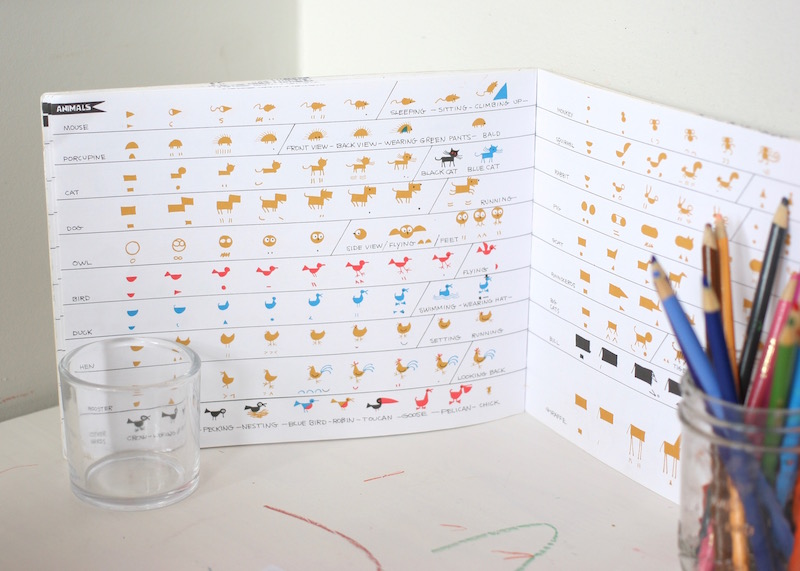
I’ve been meaning to link to this superb writing on postpartum depression on Katrina’s blog. I have experienced moments like she describes and I think she nails the elements exactly. The buzzing thoughts, the way the dark moments can tip the scale, the physical notes that come into play–eye contact, smiles. An excellent read, particularly if you’ve had friends go through this, or brushed against it yourself.
A bit of back story, so you catch the details: Katrina, a calligrapher, painter, and devoted Catholic, gave birth to her baby girl with two young boys already tumbling about her in a tiny space on campus with her husband deeply into graduate school.
-
Grinching triumph
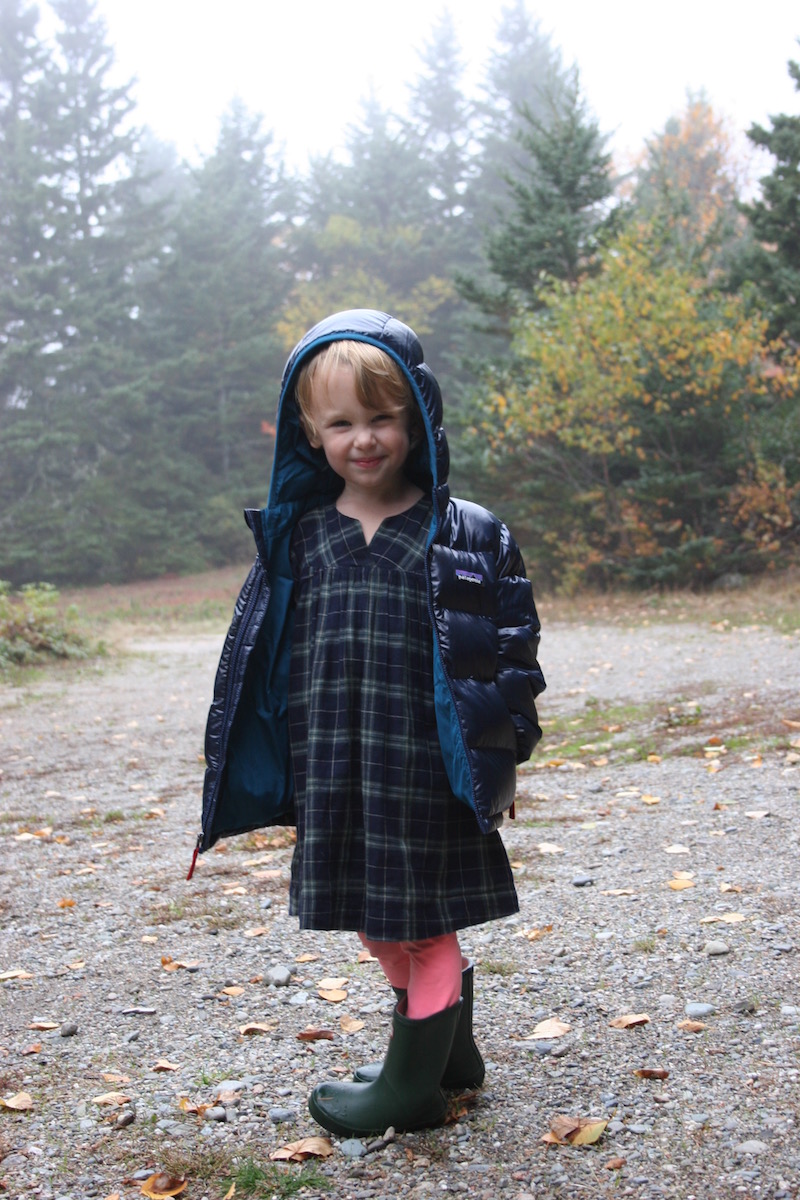 “I know why the Grinch doesn’t like Christmas. Because his Sister Grinch died. And SHE was the one who wrapped all the presents and bought the pumpkins. She was the one who put up the lights. He can’t do it because he’s at work all day and he’s TIRED. That’s why he doesn’t like Christmas.”
“I know why the Grinch doesn’t like Christmas. Because his Sister Grinch died. And SHE was the one who wrapped all the presents and bought the pumpkins. She was the one who put up the lights. He can’t do it because he’s at work all day and he’s TIRED. That’s why he doesn’t like Christmas.”-Joan, zeroing in on the near-Grinch lurking in all of us.
Things have felt mystifyingly terrible since that foolish and violent man was elected. It even feels hard to pray for, or hard to know where to begin with my prayers. The young soldiers who will soon be sent to more wars? The terminally sick who so-briefly had insurance that will be shoved off again? The companies that will move to other countries where skilled workers are accepted, regardless of their nationality? The police brutality that will unfold? Funny how things that feel very close and fragile can feel the hardest to pray for. Like it’s too risky for me to acknowledge how worried I am.
My friend suggested we start reading up on the resistance movement in world war II. (Here I always think of a favorite story of Norwegian citizens hopping on skiis and cleverly skiing in to disable a hydroelectric plant.) Joe’s family is Mennonite, a religious group that’s been quietly disagreeing with the government for years–deeply pacifist; attempting to redirect their taxes away from the military defense, devoted to issues of social justice and the marginalized. The idea of actively and consistently fighting with your government is not a new one. But it sounds mighty tiring. Though, I sort of fell in love with the idea of political PARTIES mentioned here.
Still, the hearth keepers must carry on, kneading the bread and chopping the kale, even as their ear tips towards the Diane Rehm Show playing in the background. Ruminate over ice skating lesson fees. Request a list of favorite Christmas books from the library. Remark upon the desperate need for plain candles in the house. Pull out coats and boots for the coat drives at church.
We didn’t guide the girls into beliefs of Santa as a gift-giver, but Joan is a big fan of his nonetheless, in the general good-citizen category. So I’ll map out a few places to take her to see him. (What if you could visit a favorite dignitary, and talk with them on a nice armchair for awhile?)
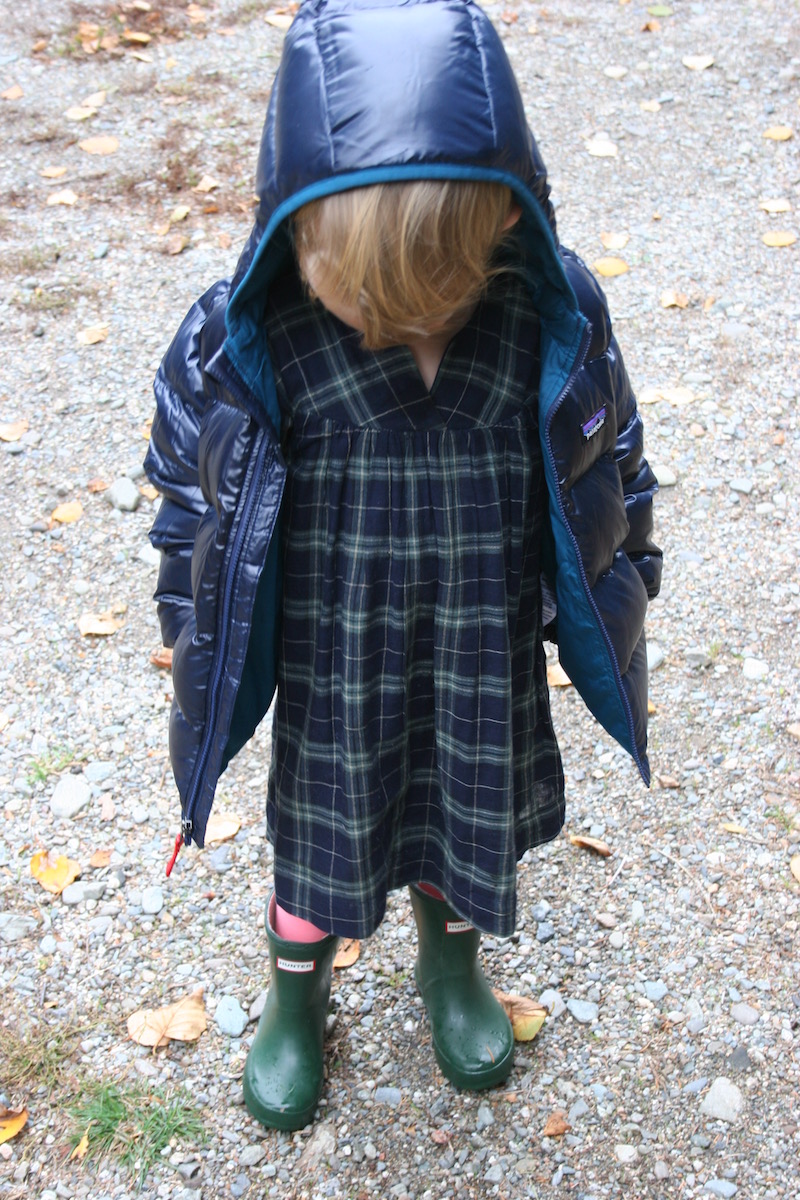
-
Many Kids Club
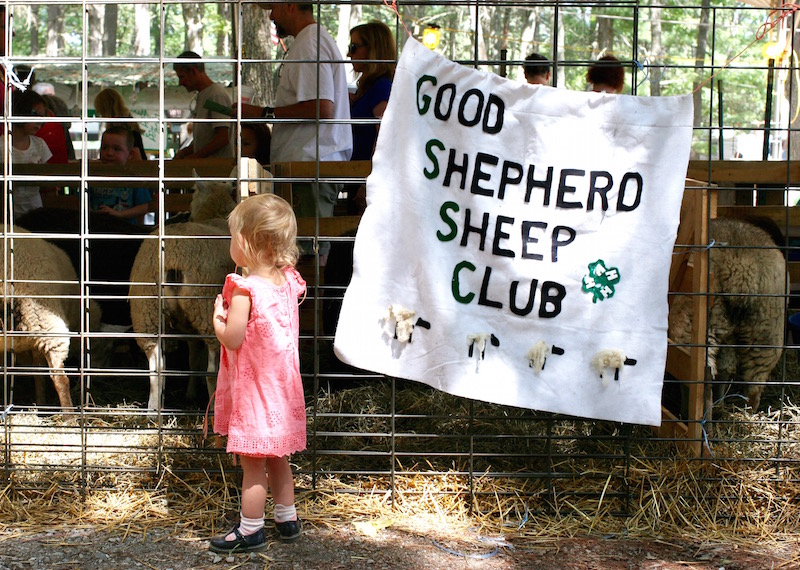
It seems I am the chosen jurist for everyone deliberating another child. Friendly moms I do not know sidle up to me. They’ve noted the two children, and now, the belly. They make small talk, then get to it: “yeah, so, how did you decide to go for that?” “What?” I ask innocently, “three?”
“I mean, we’re debating. We’ve been talking about it, over and over again. But you know—more kids means bigger car, bigger house, right? And the plane tickets! And what about hotel rooms? Do they let you bring three kids into a hotel room?”
I am truly the worst consultant they could resource this pro bono work to. I genuinely haven’t given thought to half the concerns they’re studiously mulling over. It wasn’t until I was 4 months into this pregnancy that my friend pointed out, to my surprise, that we wouldn’t all fit into a taxi anymore. “You think you can, and then you can’t,” she firmly said of families of five.
But instead of bringing their debate to a reasonable well-researched person of able body and mind, they’ve unwittingly stumbled on an aging Irish Catholic grandmother in the body of a petite Midwestern thirty-year-old. “Well, it’s so much better for later in life.” I state with authority. “You know—more in-laws. More phone calls. More grandchildren.” Their eyes mist a bit and they’re tracking along with the pretty picture of a quiet cozy living room inundated with telephone calls.
Then I pull out one of my darker rationals: “Just think of the burden you’ll be on them if there’s only two.” They frown, with an absent look in their eyes. Perhaps my maniacal glint of hormone-fueled-procreation goes too far on that one. Though, I’ve found I am not the only one who leans towards the darker side of these discussions. “The way they’re dying these days, you should just keep going. I mean–those motorcycles!” remarked a retired nurse to me the other day (somewhat surreally, as the girls and I licked our ice cream cones in the sun).
Clearly these are two sides of the same trippy mental coin: to me, they seem overwrought with controlling their current circumstances in a way that won’t pay off: is life with two kids actually going to be magically easier? Didn’t they already exchange so much of “normal life” just by having those two? If their lives are better with two personalities, why wouldn’t they be exponentially better with three? I guess at root I doubt the accuracy of meticulously measuring out elements of their life.
And on the other side of the coin, I have built my daily outlook on a prediction for thirty years from now. I would be wise to remember that I might not even be around then, and zen to recall that it is THIS moment, the chaotic, daily, non-stop child-rearing one, is the one that matters most anyway.
The trouble for these folks is that they walked up to me in a state of uncertainty. I have many friends firmly in the only one camp or only two camp. I’ve listened carefully to their reasoning and admire their vision. I would never attempt to argue them out of their position, nor would I think my position offered them anything. Often I think of the Bible stories involving women begging God for just one child–take sweet, elderly Elizabeth and Zachariah for example. The gift of one life-changing child is not to be lightly brushed over. As kids, my sister and I relished joining in the relative peace of our neighbor’s home–a family of four. Things seemed calm and full of possibility over there, with lots of extra craft supplies and snacks to boot.
Where’s this all going? A medley makes the world go round. Just don’t ask the old Irish lady at the playground for advice.
-
baptism

My heart did a little skip every time I thought about Joan being the star of the show on Sunday. Even though I can’t pay attention to her most of the time, even as she has to start crying before I notice that Lux is sitting on top of her feet, I still like for her to get fair praise. I’m awfully fickle with who I feel needs attention in my household—if too many strangers coo over the baby, I direct the conversation to Lux. If everyone is laughing over what Lux is saying, I start to chirp about funny baby things Joan has done lately.

But it just seemed so right, for us to think about Joan for a bit, to light a candle and gather round and celebrate her existence and say out loud that we hoped she would know God and that we would raise her with that hope. At our Episcopal church, the Baptism part slides simply into a normal Sunday service. Between the homily (more of a meditation/story than a sermon) and communion. The four of us went up to the front, plus David, our dear friend-godfather of both of the girls. We talked through, out loud, a series of questions about what we hoped for Joan. Sammy, who was the presiding priest for the day, is our good friend. I’ve probably shared as many drinks with him as I have heard sermons from him, which is a nice thing to feel when you’re handing over your daughter for some legit blessings.
Maybe it’s the bourbon, but I get weepy thinking about this now. “And will all you who witness this,” Sammy’s voice rang out across the pews, “do all in your power to support this child in her life in Christ?” “We will,” answered everyone, strangers some, old friends others. It was beautiful.
Not to say this is what she will choose for herself in the future, not to say that she won’t have moments of thriving and withering, but to say now, in this moment, we acknowledge our part in what she is raised to believe. “…give her a spirit to know and love you, and the gift of joy and wonder in all your works.”

Then the entire congregation trouped to the back corner of the church, to gather around the stone font with its hammered copper bowl. This is my favorite part because from my corner you feel surrounded by a small sea of faces watching and smiling. Sammy dramatically poured water into the bowl, intentionally splashing some over the edge onto the giggling kids below. Joan got sprinkled and anointed with oil that smelled like balsam and fresh cut trees. Salt, for wisdom, was pressed onto her tongue. The kids gathered close and watched every move, laughing when she yawned and hoping she might let out a shocked cry at the salt (obviously she didn’t because she’s born to love salt just like Lux and me. Heritage).

We brought a case of Sofia blanc de blanc, the California sparkling wine that comes wrapped in pink cellophane, to celebrate with everyone afterwards, the early hour notwithstanding. It’s a fruity sparking wine, perfect for the morning. I made 70 golden gougeres (ina’s recipe, easy, reliable, five stars on the crowd-pleasing) and piled them into a big bowl next to the chilled bottles. They go best with champagne if they are hot and crunchy out of the oven, but they still taste sharply of gruyere and softly eggy, even when they are one day old.
<thanks to Kelsey and Julianne for the photos>
-
baptism dress
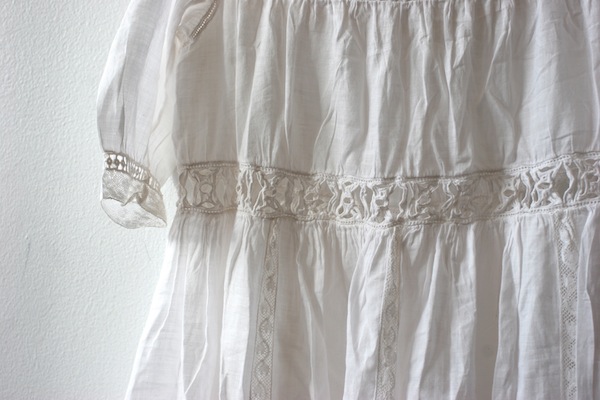
A couple weekends ago I spent a cold morning helping organize a tag sale. Joe entertained the girls back at the apartment while I met up with three other moms at our playground. We had our paper cups of coffee, our mittens, and tons of donations. There were big bags of clothes, and my job was to hang up each item of children’s clothing and place it on the right size rack. Organizers got first dibs on shopping, but Lux doesn’t really need anything, so I had just pulled out a box of infant socks so far.
AND THEN a woman dropped off a ziplock bag of antique linens. A bag, I’m not kidding. Folded over delicate dolls’ jackets and infant victorian-style tops, and two dresses that looked like baptism dresses to me. I pulled those out to buy for myself, and packaged up the rest of the bag for some other antique-lover to find. It seemed like too much for one person to claim all for themselves.
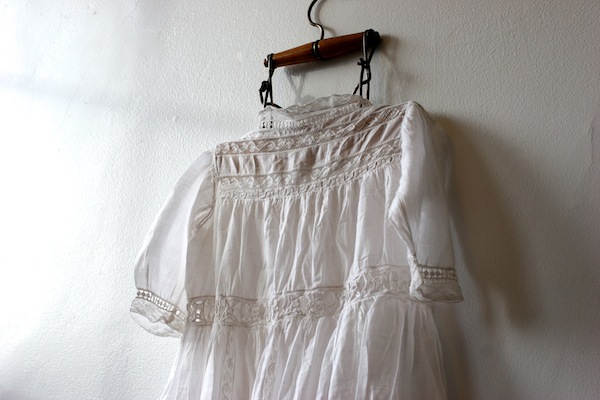
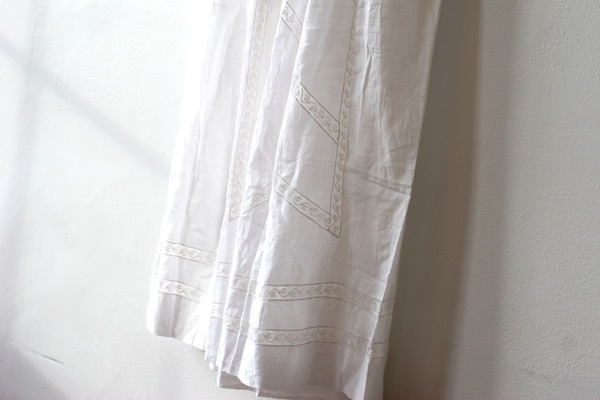
This dress, the one Joan wore, is so pretty, and I feel lucky to have it. I like to think about the woman who made the dress. I bet she made it by hand, and I bet she picked out the lace months beforehand. I wonder if she made it for a boy, or a girl, or maybe both, for her whole family. It must be at least 100 years old but it’s in such beautiful shape.
So this will be for whoever comes after Joan. And maybe, just maybe, it will make it to a granddaughter someday.